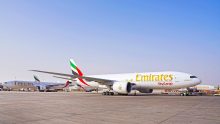 Geopolitical uncertainty and unpredictability could fuel demand for air cargo as shippers move to benefit from the stability of services. Figures from data provider Xeneta show that air cargo demand increased by 9% year on year in December – although this is partly a reflection of a weak end to 2022 – while spot rates reached their highest level in nine months of $2.60 per kg and the dynamic load factor increased by 3% to reach 59%. And Xeneta chief airfreight officer Niall van de Wouw said this could mark the start of a new cycle for air cargo, with shippers likely to appreciate stability returning to the market allowing them to “more accurately predict the transportation costs for the products they are selling”.
Geopolitical uncertainty and unpredictability could fuel demand for air cargo as shippers move to benefit from the stability of services. Figures from data provider Xeneta show that air cargo demand increased by 9% year on year in December – although this is partly a reflection of a weak end to 2022 – while spot rates reached their highest level in nine months of $2.60 per kg and the dynamic load factor increased by 3% to reach 59%. And Xeneta chief airfreight officer Niall van de Wouw said this could mark the start of a new cycle for air cargo, with shippers likely to appreciate stability returning to the market allowing them to “more accurately predict the transportation costs for the products they are selling”.
He pointed out the ocean freight market is facing disruption due to attacks in the Red Sea. Van de Wouw said: “There’s still a lot of friction in the global supply chain market and that means there will be opportunities for some sectors. If big ocean carriers are not going through the Red Sea, it might delay a million or more containers, with all the knock-on effects. “And the fact that you don’t know how long this situation will continue means some shippers will pay for the predictability of air cargo to lessen the impact of the current ocean freight disruption.
 Cargo Breaking News
Cargo Breaking News


